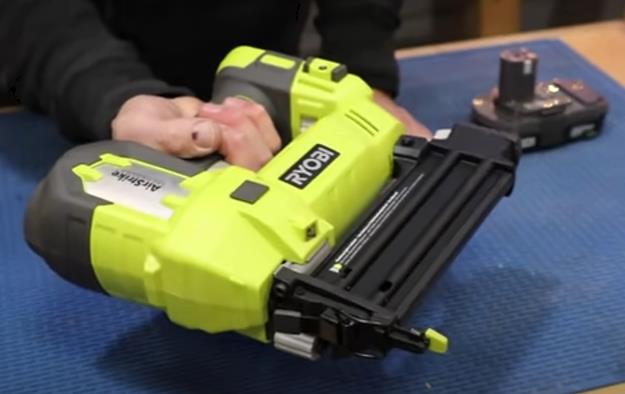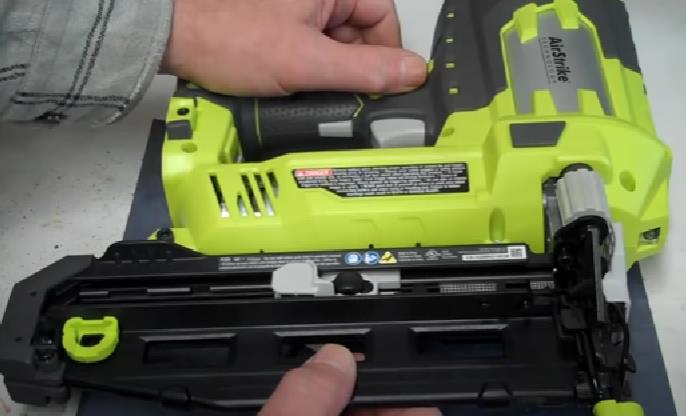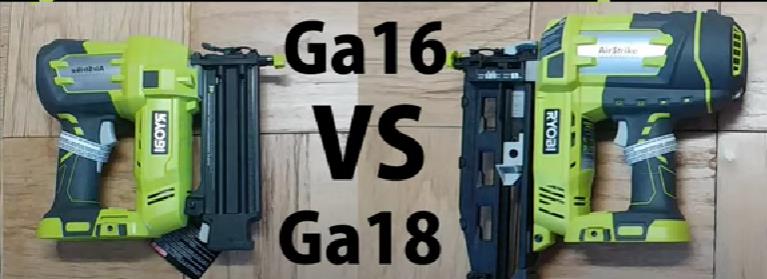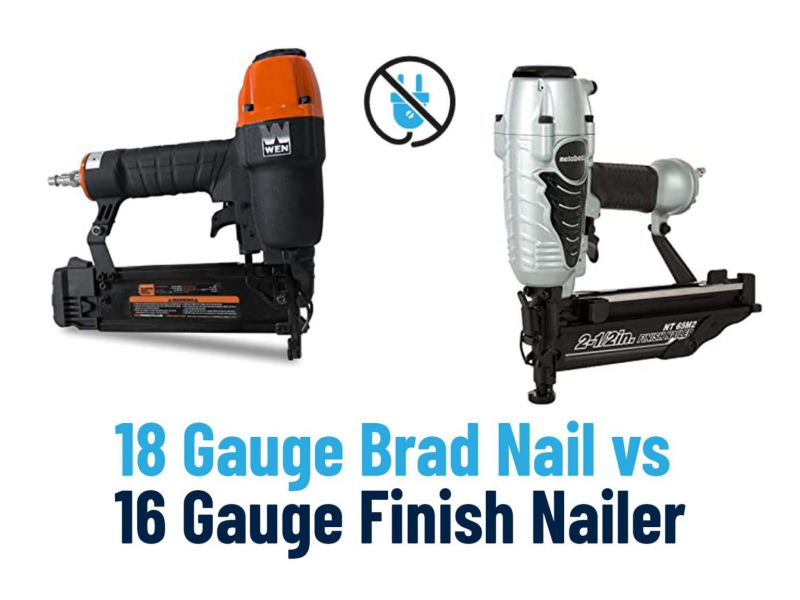Have you ever found yourself in the middle of a project, wondering which type of nails to use? This content will help you figure out the differences between 18 Gauge Brad Nail vs 16 Gauge Finish Nailers.
There are a few key differences between 18 gauge brad nails and 16 gauge finish nails. The most obvious difference is the size. 18 gauge brad nails are smaller than 16 gauge finish nails. This means that they are less likely to split the wood when being driven in, and are more suited for delicate work.
However, let’s take a closer look at two of the most popular nailers on the market—the 18-gauge brad nail and the 16-gauge finish nailer—and compare their features, benefits, and drawbacks so you can make an informed choice.
I think there should be enough understanding of brad nails and finish nailer before distinguishing between 18 gauge brad nails v 16 gauge finish nailer. So let’s discuss them in detail.
Brad Nail

Brad nails are small, thin nails commonly used in woodworking and finishing carpentry projects. They are typically 1 to 2 inches long and have a thinner diameter than other types of nails.
Brad nails provide a subtle and discrete fastening option for trim and decorative work. Due to their small size and thin diameter, they are less noticeable once they are in place. This makes them great for projects that need a clean, finished look.
Finish Nailer
Finish nails are thicker and larger than brad nails. They are typically 2 to 4 inches long and have a thicker diameter, making them more suitable for heavy-duty tasks like framing.
Finish nailers are typically used for heavier and more demanding projects, whereas brad nailers are specifically designed for finer and lighter work.
Finish nails provide a strong and sturdy hold for heavy-duty tasks. Because they are bigger and have a thicker diameter, they are better for projects that need a stronger hold, like installing decking or large baseboards.
Now, check out the explanation of gauge in relation to brad nail and finish Nailer.

Gauge
The gauge of a nail is its thickness or diameter, which is a key part of figuring out how strong and well it will hold. The thinner the nail, the lower the gauge number.
Gauge is used to distinguish between different types of nails in the case of brad nails and finish nails, with a lower gauge number indicating a thicker and stronger nail. 18 gauge brad nails, for example, are thinner than 16 gauge finish nails.
It is critical to select the appropriate gauge of the nail for your project based on the type of wood and the level of holding power required. Thicker nails hold better, but they are more obvious. Thinner nails are less obvious, but they may not be strong enough for heavier or thicker pieces of wood.
Differences Between: 18 Gauge Brad Nail vs 16 Gauge Finish Nailer

Brad nails and finish nails are two types of fasteners that are commonly used in woodworking and carpentry. While both serve the purpose of joining wood pieces, they each have unique characteristics that make them ideal for different projects.
Here are a few key differences between 18 gauge brad nails and 16 gauge finish nails.
Size
- 18 Gauge Brad Nails: 18 gauge brad nails are small, thin nails ranging from 1 to 2 inches. This makes them an excellent choice for light-duty tasks because they are less likely to detract from the appearance of the piece on which they are used.
- 16 Gauge Finish Nails: It is larger and thicker than brad nails, ranging in length from 2 to 4 inches. Because they have a stronger hold than smaller, thinner nails, they are better suited for heavy-duty tasks.
Diameter
- 18 Gauge Brad Nails: Because 18 gauge brad nails have a thin diameter, they are less visible once installed. This is especially important for projects that must appear clean and finished because the nails will remain the same color as the piece.
- 16 Gauge Finish Nailer: Finish nails with a diameter of 16 gauge are thicker than brad nails, making them more visible when installed. This is usually not an issue for heavy-duty tasks because the emphasis is on providing a strong and sturdy hold rather than a clean, finished look.
Uses
- 18 Gauge Brad Nails: It is ideal for light-duty tasks like trim work, crown molding, and baseboards. They are less likely to damage delicate trim pieces and do not detract from the piece’s appearance due to their small size and thin diameter.
- 16 Gauge Finish Nailer: 16 gauge finish nailer are ideal for heavy-duty applications such as framing, decking, and large baseboard installations. Because they are bigger and have a thicker diameter, they are better for projects that need a strong hold.
Advantages
- 18 Gauge Brad Nails:
- They are small and discreet, making them ideal for delicate joinery work.
- They are easy to conceal, making them ideal for fine finishing work.
- They do not split or damage the wood because they lack a large head that can drive into the grain.
- 16 Gauge Finish Nailer:
- They have greater holding power than brad nails.
- They are more durable than brad nails, making them suitable for outdoor use.
- They are best suited for heavier or thicker wood pieces.
Disadvantages
- 18 Gauge Brad Nails:
- They may need to be stronger to hold heavier or thicker wood pieces.
- They are unsuitable for outdoor use because they are not as strong as other nails.
- 16 Gauge Finish Nailer:
- Because they are smaller than brad nails, they could be better for fine joinery work.
- If not driven incorrectly, they can split or damage the wood.
Brad nails are smaller and less noticeable than finish nails, which makes them perfect for fine woodworking. Finish nails, on the other hand, are bigger and stronger, making them perfect for heavier or thicker wood pieces.
Comparison Table of 18 Gauge Brad Nailer and 16 Gauge Finish Nailer
Here I will share a table so that you can easily understand 18 gauge brad nail vs 16 gauge finish nailer, which one is right for your project.
| Characteristic | 18 Gauge Brad Nail | 16 Gauge Finish Nail |
|---|---|---|
| Nail Size | Smaller | Larger |
| Type of Nail | Brad | Finish |
| Use | Smaller Projects | Larger Projects |
| Price | Cheaper | More Expensive |
| Quantity in Pack | Higher | Lower |
| Quality | Not as Good | Higher Quality |
| Durability | Not as Durable | More Durable |
| Weight | Lighter | Heavier |
Similarities: 18 Gauge Brad Nail and 16 Gauge Finish Nailer
Similarities between 18 gauge brad nail and 16 gauge finish nailer include their use for nailing wood and wood-based materials, as well as their general design and function as power tools. However, 18 gauge brad nail vs 16 gauge finish nailer, these have some similarities. Like:
- Both are commonly used for finishing work in carpentry and woodworking, such as trim and molding installation.
- Both can be driven using a nail gun, making it easier and faster to attach wood pieces.
- Both are available in similar lengths, usually ranging from 2 to 2-1/2 inches for brad nails and 2 to 3 inches for finish nails.
Related FAQ- 18 Gauge Brad Nail vs 16 Gauge Finish Nailer
Can I use a 16 gauge finish nailer for fine finishing work?
While a 16 gauge finish nailer can be used for finer finishes, the larger nails may leave visible holes, and the tool itself is bulkier and less precise than a smaller brad nailer. For fine finishing work, an 18 gauge brad nailer is preferable.
Can I use 18 gauge brad nails in a 16 gauge finish nailer?
No, 18 gauge brad nails cannot be used in a 16 gauge finish nailer because the tool is designed for larger and stronger 16 gauge nails. Attempting to use smaller nails may result in jams and tool damage.
Is an air compressor required to use a 16 gauge finish nailer?
Yes, a 16 gauge finish nailer is a pneumatic tool that an air compressor must power. The size of the compressor needed will depend on the type of work being done and the model.
Sum Up
There are a few key differences between 18 gauge brad nail vs 16 gauge finish nailer. The most obvious difference is the size. 18 gauge brad nails are smaller than 16 gauge finish nails. This means that they are less likely to split the wood when being driven in, and are more suited for delicate work.
16 gauge finish nails have a slightly longer head than 18 gauge brad nails. This makes them less likely to pull through the wood when being driven in.
So, which one should you use? It really depends on the project you are working on. If you need a more delicate touch, then go for the 18 gauge brad nails. If you need something more durable, then go for the 16 gauge finish nails.
If you’re still unsure about the difference between 18 gauge brad nail vs 16 gauge finish nailer, please leave a comment below and we’ll be happy to answer your questions.




5 thoughts on “18 Gauge Brad Nailer Vs 16 Gauge Finish Nailer”
Comments are closed.